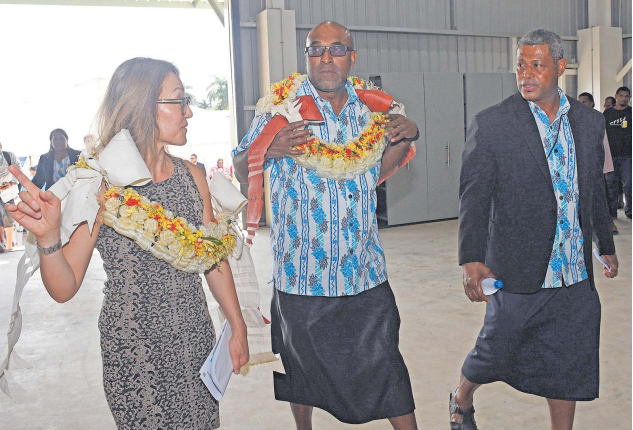FIJI’S Ministry of Health and Medical Services (MOHMS) relies heavily on the Fiji Pharmaceutical and Biomedical Services (FPBS) to manage the country’s medicine and medical supply distribution network.
The FPBS, the sole warehouse for the ministry, plays a critical role in ensuring that more than 200 health facilities across the islands are supplied with essential medicines, vaccines, medical equipment and other health-related products.
In a recent media tour, the ministry provided insights into the operations of the FPBS warehouse, highlighting its vital role in managing the country’s pharmaceutical supply chain.
The tour was prompted by growing media inquiries into shortages of medical supplies, which were largely attributed to global supply chain disruptions.
Procurement and distribution challenges
Fiji, as a nation that lacks the capacity to produce most of its medical supplies locally, is heavily dependent on international suppliers.
According to the ministry’s permanent secretary, Jemesa Tudravu, once medicines arrive in Fiji, they are directed to the FPBS for processing and distribution.
This process is further complicated by global logistical challenges, including manufacturer delays, transportation issues and periodic shortages of key products.
FPBS director Jeremaia Mataika explained that the warehouse is responsible for distributing medical supplies to over 200 health facilities, including divisional and specialist hospitals, health centres and nursing stations.
According to Mr Mataika, the facility operates under a structured distribution plan, with most locations receiving supplies monthly, while more remote areas, such as those in the maritime zone, are supplied quarterly.
“At the moment, our budget has risen from over $60million, and now I think it’s sitting around $95.2million, and in terms of where we supply, we deliver supplies around the country,” Mr Mataika said.
“So, in totality, at the moment, with Fiji Pharmaceutical and Biomedical Services, we have 105 staff, and we have about 14 medical categories.”
Procurement process and tendering system
The procurement of medical supplies is governed by the Financial Management Act and government procurement regulations.
Mr Mataika explained that for purchases exceeding $50,000, the FPBS conducts a formal tendering process, which can take months to complete.
“In terms of purchasing, we have a purchasing department here as well, we do follow the Government’s process of tender, and the short form of purchasing, as we all know, is calling for quotations.
“When we do a tender, that means we are trying to secure a particular supplier.
“We can contract them for three years, and we can contract on the price, and then we can maintain that price for the next three years.”
Mr Mataika said FPBS works closely with the Medicines Regulatory Authority to ensure all purchased medicines meet safety and efficacy standards.
If any product fails to meet the required standards, it is either returned to the supplier or replaced.
Adopting digital solutions
One of the most significant advancements in the FPBS’s operations has been the implementation of the M-Supply system, a digital inventory and procurement management platform.
Mr Mataika said this system allows health facilities across Fiji, including those in remote areas like Rotuma and the interior of Viti Levu, to place orders electronically.
With support from the Government of Australia, M-Supply has been rolled out to all 230 health facilities, enhancing the accuracy and efficiency of supply chain management.
“We have a team that looks after the M-Supply, and then they can actually, they run reports,” Mr Mataika said.
“So, on a monthly basis, we run reports and then look at the reports and those that help us make decisions.
“For this one, how do we respond to minimal stock level? One is prioritising critical medications, emergency procurement, inter-facility redistributions, informed healthcare facilities.
“I know there’s a lot of questions on stockouts and other things, but there are a lot of supply chains. There’re never-ending logistic issues.”
Logistical efforts and warehouse expansion
To further address logistical challenges, the FPBS is working on expanding its warehousing capacity.
Currently, there is only one central warehouse in the capital, but plans are underway to build additional warehouses in the Northern and Western divisions to better serve the country’s diverse geographical needs.
Mr Mataika also highlighted how the FPBS learned valuable lessons during the COVID-19 pandemic, when closed borders and disrupted supply chains made it difficult to distribute essential medical supplies.
The ministry has since prioritised building additional warehouses and pre-stocking critical items to mitigate similar issues in the future.
Ensuring quality and availability
Mr Maitaka said the ultimate goal of the FPBS is not just to ensure that health facilities are stocked, but that they are stocked with medicines and medical products of the highest quality.
The Medicines Regulatory Authority plays an essential role in overseeing the safety, efficacy and quality of medicines procured by FPBS.
The authority works with the National Medicines and Therapeutics Committee to maintain an essential medicines list, ensuring that only the most appropriate and effective medicines are available to patients.
Despite the ongoing challenges faced by the FPBS, including global shortages and logistical delays, the ministry continues to prioritise the procurement and distribution of life-saving medications, particularly those in high demand, such as antibiotics, chemotherapy drugs and emergency medications.
Looking ahead
Looking to the future, Mataika and his team are focused on enhancing the supply chain through better inventory management, strategic stockpiling and further digitisation of operations.
With the continued support of international partners and a renewed focus on strengthening local logistics and warehouse capacity, the FPBS is working to ensure all Fijians, no matter where they live, have access to the medicines and medical supplies they need.



